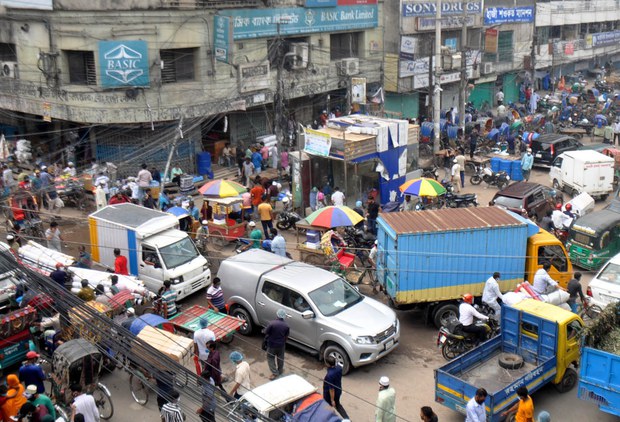Vehicles, Hawkers Fill Dhaka Streets as COVID-19 Cases Increase
2020.05.11
Dhaka
 Vehicles and people fill Dhaka’s Babubazar commercial district after the government allowed some businesses to re-open on a limited scale, May 11, 2020.
Vehicles and people fill Dhaka’s Babubazar commercial district after the government allowed some businesses to re-open on a limited scale, May 11, 2020.
Bangladeshi officials confirmed more than 1,000 new coronavirus infections on Monday, even as activity picked up in the streets of Dhaka due to easing of curbs meant to contain the pandemic.
Smaller vehicles took to the streets, and hawkers and shops were open for business, as officials and health experts expressed worry over the lack of social distancing, and authorities announced the largest daily jump in cases to date, 1,034.
“Mechanized and non-mechanized three-wheelers, motorcycles, private cars and other vehicles flooded city streets as the government opened businesses on a limited scale. The trend of flouting the physical distance has increased, too,” professor Mahbubur Rahman, a physician and health expert, told BenarNews.
“Already the number of new COVID-19 infections has been going up every day. Because of this opening, we will see more infections and deaths,” he said.
The novel coronavirus has infected 15,691 people in Bangladesh and killed 238 since March 8, according to the latest official tally.
Obaidul Quader, general-secretary of the ruling Awami League and transport minister, said the easing was meant to alleviate economic suffering. But he blamed people for not taking necessary precautions.
“The government relaxed the public holiday for the sake of the poor, hapless and jobless people. It is unfortunate that most people in Dhaka and other parts flouted the physical distancing guidelines,” he said, referring to the government shutdown to contain the spread of COVID-19.
“At shops and other businesses, the health guidelines are not followed.”
A shopkeeper told BenarNews that he reopened because he worried about making ends meet.
“I stayed at my village home in Araihazar for one-and-a-half months while there was no work. As the government opened businesses, I opened my shop,” Md Jahidul, a Dhaka footwear seller, told BenarNews. “I have to open the shop, otherwise people like us will die from starvation.”
Relief for slum dwellers
In poorer parts of Dhaka, fears of going hungry have eclipsed anxiety over the highly contagious virus.
“I used to work in different houses as a freelance maid. Now, nobody is allowing me in their houses. I have lost the income source,” Jarina Begum told BenarNews.
“There is no time to think about the coronavirus. Seeking food and medicine has become more difficult,” said Nurul Islam, a man in his 60s who cannot work due to chronic illness.
Some slum dwellers said charities had supplied them with food and other relief aid.
“This is not the time for the poor to die of hunger,” said Jasim Uddin Khan, president of one such organization, the NGO Songey Achi (“We are with You”). He said the government was helping the poor as well.
“Police are delivering food to people, if anybody goes to a police station and says he or she has no food to eat,” he told BenarNews.

City official Shamim Hasan said officials were going door-to-door to distribute rice and other food items.
“We are trying to reach every person,” he said.
Khan acknowledged there were flaws in efforts to provide relief to the poor.
“Many people are getting assistance repeatedly while some others are being left off. Had there been a database of slum dwellers, poor and floating people, the aid could be managed properly,” he said.
Last June, Tajul Islam, minister for local government, rural development and cooperatives, said Dhaka’s 3,394 slums are home to 646,000 people – including many who survive by working as rickshaw-pullers, maids, garment workers and hawkers.
Police sealed a slum in Sher-e-Bangla Nagar after a resident tested positive on April 8.
“There is no alternative but to lockdown an entire slum if anybody is found to be COVID-19 positive,” Dr. A.S.M. Alamgir, chief scientific officer of the government-run Institute of Epidemiology, Disease Control and Research (IEDCR), told BenarNews.
“It is true that the slums cannot maintain social distancing. They must be taken to institutional quarantine, if someone is found to be infected, before the situation turns grave,” he said.
Globally, more than 4.1 million people have been infected by COVID-19 and more than 284,000 people have died, according to the latest data compiled by disease experts at Johns Hopkins University in the United States.







